‘Hey Mr Dream-Seller, tell me how’s it gonna be. Are the Salmon running? Are there fish you can see? Have you, as the song says, dreams enough to spare?’
Comes the answer: ‘Fish are moving and the river’s looking great - and it should hold well for the whole of your week’. All of which sounds very promising. But buyer beware; we hear what we want to hear and nowhere do these words say there are more than a handful of salmon in the river.
The language of guiding has always been creative and bendy, but as the Salmon and Steelhead runs diminish this inventiveness is being tested. Telling anglers what they want to hear without promising the impossible is an art form, although it helps that no audience was ever more willingly misled than we fishing junkies. There is nothing we want to hear more than that we’re arriving at a river full of fish.
Back in the real world, far from any river, deceiving clients is easier. The clerk on the airline check-in (if you can find one) has always promised that your seat has extra legroom and your baggage has been checked all the way through. This is done with impunity because by the time you find out that your seat is in the loo and your baggage in Bahrain, you are a continent away. On a river your guide must sell you a dream that holds you enthralled for the duration of the trip. You’re both in it together and, for added frisson, there’s that tip at the end.
The scale of this challenge cannot be understated. At one of England’s salmon fisheries, a famous hotel, the total salmon catch last year was 1. That’s right: One salmon. Imagine being a guide with that to deal with. So, let’s go fishing: We’ve arrived. It’s our big week and our hopes are high. The anxious first question we ask is “How’s the fishing?”.
‘Hey!’ the guide smiles broadly. ‘Great to meet you. The river’s in fine condition and we’re gonna have a really good time’. Our pulse quickens in anticipation of the thrills to come. It’s going to be an awesome week!
Later, after all the pleasantries are done, the bags unpacked and the tackle checked, there will be a more serious word in your ear: “The river’s looking terrific and the water levels couldn’t be better, but – I’ll be straight with you – the salmon are running a little late this year”. This should set your alarm bells ringing. The phrase used to mean that the February salmon had arrived in April, presumably in an act of contrarian defiance against the early arrival of spring. Nowadays this trend is taking a desperate turn and the truth would sound something like this: “We don’t know where the fish are. In recent years the redds have been a hot tub, the sea nets are longer and finer, the fish farm’s doubled in size and the town sewage works pumps raw effluent to match the farm slurry.” Apex predators vary from country to country but you can be sure they’re also in trouble. The entire ecosystem is in decline.
Against this fishless backdrop of warm and perhaps excremental water (try fishing in England or Wales) our hapless guide must keep our spirits up for a whole week. And that takes a very special sort of talent.
If I create the impression that I’m singling out guides and gillies as the reality-benders, it’s because I am. And I have a great deal of sympathy for their plight because, if I were your guide, I’d do the same.
It’s not the guide’s fault. He or she is a decent human being with a job to do and bills to pay. But the unvarnished truth can be brutal and visitors who believe there are fish to catch are easier company than those whose hopes have been dashed before a fly is cast. There’s also a trade-off in this: As less time is spent catching fish so more must go into managing the client. This is compounded by the human weariness that sets in as a dud week unfolds.
Meanwhile, back at our accommodation, the new day is here and it's time to hit the river. The guide’s rules are simple: Keep smiling and remember that the lack of action can’t be blamed on the visitor, no matter how badly they fish. And no self-respecting guide could ever say it’s down to poor guiding. So, if we can’t blame the angler or the guide and we’ve already agreed the river is looking great, what does that leave? We can’t, at this early stage in the week, blame the fish because the illusion of their presence is why we’re here. In defiance of reality, we must travel hopefully.
For once the world is on the guide’s side. The ubiquitous Global Fishing Mega-Corp has fragmented fishing tackle into so many interchangeable and marketable parts that I doubt anyone has yet explored all the mind-numbing combinations that can now connect a reel to a fly. Mostly they just connect Mega-Corp with your bank account.
Changing tackle combinations looks like rational problem-solving and keeps the client optimistic. For a single Skagit line there can be some 28 mow-tip variations (perhaps doubling by the time you read this) one or two of which might even be appropriate. Thankfully there are cheaper alternatives. Then there’s the leader and, if time drags, we can learn some new knots. And if that doesn’t work there’s always a Scandi or a Spey or just a good old-fashioned WF line on a single-handed rod. Or a single-handed Spey line. How long have you got? (Answer: A week).
Top of this list is the fly, the interminable way to fill time. This works because most people cling to the belief that there is a right fly to deploy right now. So devoting effort to choosing a winning fly seems crucial, even though experience suggests that successful fly selection mostly works only in hindsight. And, of course, all the time you’re making these changes the fly is on the bank. Which is a lot less disappointing than having it in the water.
I was once with a Steelhead guide whose fly wallet was stuffed entirely with bright pink flies. He carried no other colour. From this fanfare of explosive and uniform pinkness he selected a single fly that he thought would catch fish. How it differed from the rest I could not tell, but I was smitten by the concept. You can have any colour you want, provided it’s pink. And it worked. No time was wasted tying knots and 4 Steelhead were caught (there were fish in the river).
So the next time I’m with some austere gillie on a drear Scottish river I’ll have the perfect response when he asks to see my flies. What he wants to say to me is: ‘If only you had a Dour Dreich-Black Doomster Fly you might have been in with a chance. With that lot, all shiny black + a hint of exuberant silver thread, nay chance.” I’m going summon up all my courage and flash a wonderland of effervescing pink and then hope it works.
But back to our river: As the fishless week progresses the guide will see our mood disintegrate. Hope flees and life loses all meaning. We persevere because we must. Admitting defeat is not an option.
This is when I get hit with The Great Euphemism of Last Resort – an intervention reserved exclusively for the fishless angler on suicide watch. I’ve heard it on both sides of the Atlantic and it’s the moment when guide euphemisms morph into lies. And it really annoys me, not for the lie, but because I knowingly fall for it every time.
The week has reached the point where small mistakes multiply into big ones and my patience with myself is running thin. I just hope the guide is with my fishing partner and not watching my dire performance. My casting is falling apart. And then, suddenly and with a big smile, up pops the guide, as cheerful as a cheerful thing can be … ‘Hey, you’re looking great! There’s nothing wrong with your casting and you’re covering the water really well’.
The effect on me is electric. Oh WOW! A real, live pro-fisherman or woman has just told me my casting is faultless. I’m really good at this! It’s going on my gravestone as proof of a life well-lived: Here Lies Richard – Oh Boy Could He Cast! Confidence is restored, my casting recovers and I’m poised to strike when the inevitable fish takes. Life is great.
But only for a while, because reality is corrosive and this praise is not what it seems. It always comes at that moment when even a passing stranger can see that I need a bottle of wine, a whole cake and a long afternoon nap. It’s an undeniable, self-evident fact that I’m casting very, very badly. And yet I fall for it every time - hook, line and sinker.
Let’s take a step back and look at this dispassionately: The guide said ‘There’s nothing wrong with your casting’. They didn’t say anything much was right with it either. What this says is that my casting’s sort of OK. ‘Sort of OK?’. ‘Yup, it could be worse’. And if I then take another step back this is what the thought bubble over the guide’s head says: ‘What can I say? You’re getting the line out. That’s OK. But a fishless week combined with a lifetime of accumulated bad habits is taking its toll. Even if a fish shows up, the best you’ll do is give it a slapping. It’s day 6 and I’ve run out of ideas.’
Thankfully most guides are much too canny to say anything of the sort out loud.
So that’s it. The week’s heading for a dud, the guide has played their last card, and the guest is wilting. Everyone is ready to go home.
This is now happening on too many rivers and to too many people. We all know the reasons — climate change, pollution, commercial exploitation, land use, fish farming, overheated oceans and so on. As a result, guiding is becoming less about catching fish and more about providing emotional support for wilfully gullible clients. The times they are a’changing.
Inevitably, as migratory runs continue their decline, I’ll be falling for The Great Euphemism of Last Resort more often. And, much to my surprise, I really don’t mind. I’ve realized that if I’m out on the water, rod in hand, then the two sweetest little lies you can tell me are that the river is full of fish and that my casting is great. So, please, hit me with it one more time. And sometimes, every once in a while, it will be true: my casting will find that sweet spot and a fish will oblige.
But until that happens, please don’t stop: Tell me lies, tell me sweet little lies.








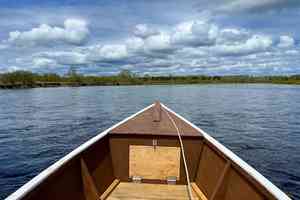


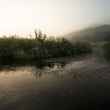
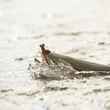
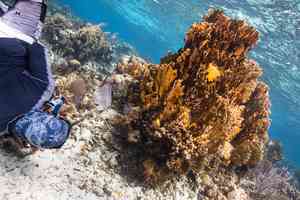








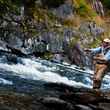



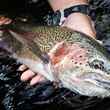
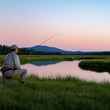
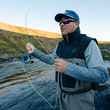
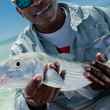
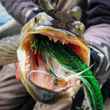
Comments